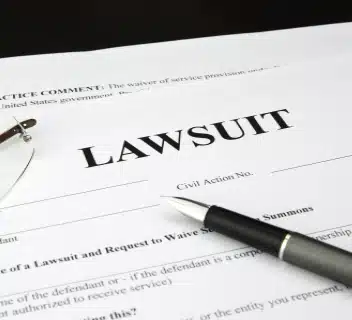The 5 Most Common Types of Lawsuits
Lawsuits (and accidents) vary substantially, but despite that, there are certain “common types of lawsuits” that occur more often than others — whether due to their unique dangers, or their ubiquity in society. These common types of lawsuits often fall under the category of civil cases, such as personal injury claims, property disputes, or family law matters. By understanding the most common types of lawsuits, you can see where your dispute fits in, and you’ll have more clarity as to some of the basic issues that you’re likely to face as you navigate the legal process.
Here at 1-800-THE-LAW2, we encourage you to call us to connect with an experienced attorney in our network for a free consultation. They’ll help you understand your case, whether it’s one of the “common types of lawsuits” or something more niche. When you’re ready, you can explore the possibility of litigation so that you can secure the compensation you deserve.
That being said, if you’d like to learn a bit more about lawsuit basics, including what sort of personal injury lawsuit is most common, then read on!
What are the most common types of personal injury cases?
Though these numbers are likely to vary quite a bit from year-to-year, and from state jurisdiction-to-jurisdiction, personal injury claims are among the most common types of civil cases. The five most common types of personal injury lawsuits are as follows:
Motor vehicle accidents
Motor vehicle accidents may include the following types:
- Rear-end collisions
- Sideswipe collisions
- Head-on collisions
- Multivehicle pileup collisions
- Single vehicle collisions
- Falling obstacle collisions
- Dangerous roadway issues
- Maintenance issues
- And more
Given the large variety of motor vehicle accidents, the ways in which these sorts of disputes are litigated are quite different. Victims of motor vehicle accidents may be entitled to compensation to cover medical bills and other expenses.
For example, in a low-speed, rear-end collision, you might have a spinal degenerative injury that only shows up years after the accident — and proving liability in that situation will be a unique challenge that will require that your attorney build up a convincing batch of expert testimony.
By contrast, in a multivehicle pileup, the unique challenge (and opportunity) you’ll face will involve suing several different defendants, each of whom may argue that they are “less responsible” for the accident than the others.
Slip and fall accidents
Under basic premises liability laws, a property owner has a responsibility to maintain a given premises in a reasonably safe condition for entrants. Failure to do so could result in serious liability if the entrant slips and falls. However, what constitutes a “reasonably safe condition” depends on the circumstances and the specific type of property, among other things. For example, if you slip and fall at a restaurant due to a pool of liquid on the floor that wasn’t cleaned up, then the question will arise: how long was the spill left on the floor without being cleaned? If it had been left for, say, two hours, then you would have an actionable slip and fall lawsuit against the defendant, since the norms in their industry would require that they inspect and clean the floors more frequently.
Workplace accidents
On-the-job accidents are among the most common in America. Despite various regulations that protect workers from safety hazards, accidents still happen. Best of all, in the event that you qualify for workers’ compensation, you don’t even have to prove that your employer was negligent — you will automatically qualify for benefits so long as you were injured on the job and were not at-fault.
Medical malpractice
A medical malpractice lawsuit occurs when a medical professional’s negligence leads to injury or sickness in a patient. Stated more specifically, medical malpractice lawsuits occur when a medical professional engages in negligence, recklessness, or intentional misconduct that contributes to the victim’s injuries. This is surprisingly (and unfortunately) common — overworked or poorly-trained physicians can make diagnostic mistakes, for example, leading to untreated cancer or other health problems that can have enormous, life-altering consequences. If medical professionals have failed to engage your healthcare with reasonable care, then they can be held liable for damages.
Dog bite injuries
Dog bite injuries are — perhaps unsurprisingly — common across the United States. If you’ve been injured in a dog bite incident, you could have an actionable claim against the owner, assuming that you did not venture onto their property or otherwise provoke their dog into attacking you. Some breeds are particularly dangerous and expose their owners to unique liability risks, so bear that in mind as you explore a case strategy.
What makes a successful lawsuit?
Though many people define a successful lawsuit differently depending on their goals — in the broadest sense, what defines a “successful” lawsuit is whether you are able to secure the maximum possible compensation for your legal claim given the evidentiary record and legal foundation behind the dispute.
Why do most lawsuits end in a settlement compromise?
Most lawsuits do, in fact, end in a settlement — industry experts estimate that as much as 95 percent of disputes are resolved through a settlement agreement.
Why?
As a general rule, trial litigation is a complex and resource-intensive aspect of civil litigation. These qualities make it best avoided in many cases — though trial litigation is absolutely an option in disputes where the other party is hostile and unwilling to settle fairly, it is best seen as a secondary option, not a primary option.
No matter how strong a case you think that you have, there’s always a risk that the court will find against you — they might rule against you entirely, or they might rule in your favor but award you lower damages than you expected. This uncertainty is innate to litigation. It is something that all parties face when navigating a dispute.
Further, the publicity of a trial is often seen as undesirable. For example, suppose that you are suing a construction company for a work accident that was caused by a failure to adhere to safety protocol on the job. If the details of the case were to be exposed to the public, the construction company might lose business — future business partners might be concerned about safety issues with the company, and might simply avoid working with them. The damage to the brand and reputation could be irreparable.
To avoid uncertainty, publicity, and other negative factors, many parties will choose to negotiate a settlement compromise — this lets them reasonably figure out what is “fair” given the evidentiary record and the legal foundation of the claims.
Is it costly to hire a personal injury lawyer?
Not necessarily. Most law firms offer contingency-based legal representation — that means they don’t get paid until (and unless) you get paid. When you hire one of these types of lawyers on contingency, you won’t have any upfront or out-of-pocket costs. Instead, they’ll take a percentage-based cut of whatever compensation amount they’re able to secure on your behalf.
This percentage can vary anywhere from 25 percent to 40 percent (or more), depending on the phase of litigation in which the case is resolved, and depending on what you are able to negotiate with the personal injury lawyer.
Contingency fee dynamics are very favorable to injury victims. That’s because it reduces the barrier to entry for bringing a lawsuit (since it costs nothing to get started and litigate the dispute) and incentivizes lawyers to work effectively on the victim’s behalf to secure the maximum possible compensation. The more you get paid, the more they get paid, after all.
You have a time limit for your claims
Regardless of the harm you sustained due to the defendant’s actions, each of your claims is still subject to a statute of limitations period — this operates as a deadline on the claim, by which you are required to bring a lawsuit.
If you do not bring a lawsuit before the applicable deadline passes, then courts will automatically dismiss your claims (should you bring them at a later time). Under the law, your claims will be deemed abandoned or relinquished. This can prevent you from securing any compensation for your losses.
Given the severe consequences of a delay, it’s critical that you work with a qualified personal injury lawyer as soon as possible after your accident. Once you get an attorney, you can rest easy knowing that they will handle your case in a timely manner — in fact, they are legally required to do so!
Contact 1-800-THE-LAW2 for a Free Legal Consultation
If you’ve been seriously injured in an accident, or harmed in any other incident that was not your fault, then you may be entitled to compensation under the law. The most common types of lawsuits share certain fundamental elements. That being said, navigating the legal process can be a challenge for first-time plaintiffs — and you may be confused about how to move forward with the dispute. That’s where we come in.
Contact 1-800-THE-LAW2 for a free legal consultation with an experienced attorney in our network. Legal representation is crucial to understanding your case and your strategic options. During the initial consultation, you’ll have the opportunity to discuss your case in detail and learn about next steps. If you decide that you’d rather not move forward with our network attorney, you can simply move on after your consultation — there’s no obligation to continue with them. As such, there’s really no downside to picking up the phone and calling in. We handle various types of cases, including contract disputes.
We look forward to assisting you.




